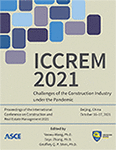Three-Party Conflict and Its Evolutionary Game Analysis in Indoor Renovation of Old Residential Quarters
Publication: ICCREM 2021
ABSTRACT
The household renovation of old communities involves the rights and interests of the owners, the renovation construction unit, and the government administration. Based on the analysis of interest demands and conflicts of stakeholders in the refurbishment of old communities, this paper constructs a tripartite evolutionary game model with owners, construction units, and the government as the main body under asymmetric information; analyzes the factors influencing the choice of game strategy and behavior evolution of each subject under different demands and supervision conditions, and the conditions that tend to be stable; carries out simulation analysis and numerical simulation. The research conclusions of this paper have certain guiding significance for rationally resolving conflicts among stakeholders, and then steadily implementing the transformation of old communities and promoting the strategy of urban renewal.
Get full access to this article
View all available purchase options and get full access to this chapter.
REFERENCES
Aneshensel, C. S., Harig, F., and Wight, R. G. (2016). “Aging, neighborhoods and the built environment.” Elsevier Inc, 18(4), 11–12.
Guo, B., Li, Y., and Cao, X. (2018). “The management dilemma of old communities and their solutions-taking the old communities of Shanxi province as an example.” Urban Issues, 2(07), 43–48. (in Chinese).
Todd, M., Adams, M. A., Kurka, J., Conway, T. L., Cain, K. L., Buman, M. P., Frank, L. D., Sallis, J. F., and King, A. C. (2016). “GIS-Measured walk ability, transit, and recreation environments in relation to older adults’ physical activity: a latent profile analysis.” Preventive Medicine, 6(12), 81–86.
Wang, B. (2016). “Exploration and practice of organic renewal of old communities in Shanghai.” Economic Research Reference, 1(38), 34–37. (in Chinese).
Wang, J. (2014). “A new idea of stabilizing economic growth under the ‘new normal’: reconstructing old communities to reverse economic downward pressure and alleviate overcapacity.” Academic Review, 31(6), 17–22. (in Chinese).
Xu, F. (2018). “Research on the participation of social capital in the comprehensive reconstruction of old residential districts in Shanghai.” Construction Economy, 6(04), 1–4. (in Chinese).
Zhou, Y., and Tang, C. (2019). “Seeking a way to govern the supply of community public goods: taking the installation of elevators in old communities as an example.” Chinese Administration, 10(09), 27–33.(in Chinese).
Zhang, X., Hu, J., and Yang, Q. (2017). “Status quo analysis of old residential districts and research on renewal and upgrade countermeasures.” Modern City Research, 11(01), 76–78. (in Chinese).
Zhu, R., and Zou, W. (2014). “From grid management to cooperation and co-governance, the path evolution analysis of China’s community governance model during the transition period.” Journal of Xiamen University (Philosophy and Social Sciences Edition), 38(1), 33–37. (in Chinese).
Information & Authors
Information
Published In
Copyright
© 2021 American Society of Civil Engineers.
History
Published online: Dec 9, 2021
Authors
Metrics & Citations
Metrics
Citations
Download citation
If you have the appropriate software installed, you can download article citation data to the citation manager of your choice. Simply select your manager software from the list below and click Download.
